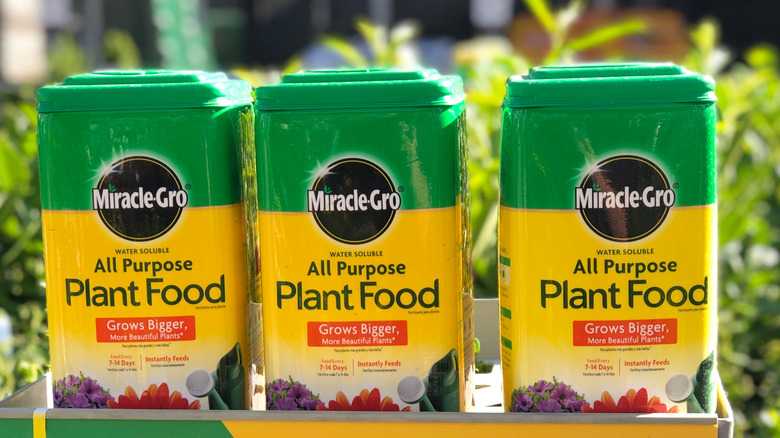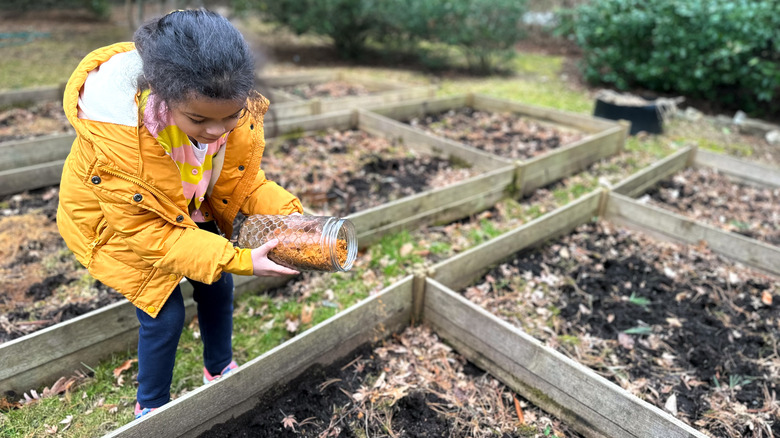Why TikTok Warns To Stay Away From Using Miracle-Gro In Your Garden
For some gardeners, Miracle-Gro is a staple in their flower beds and vegetable plots. The all-purpose fertilizer delivers a big dose of nitrogen, phosphate, and potassium along with a few other micronutrients that plants need to grow. But some TikTok gardeners are warning that the popular fertilizer may be doing more harm than good in your garden.
The main culprit is the nitrogen used in the product. The nitrogen in Miracle-Gro is derived mainly from urea. This synthetic form of the nutrient can be harmful to the health of your soil's microbes, worms and other life forms. That can, in turn, end up decreasing the quality of your soil over the long run.
If you've been using Miracle-Gro in your garden, it's worth learning how the product is impacting the life in your soil. It's also important to find out what you can do to restore the health of your soil and attract worms to your garden so that you don't need to rely on synthetic fertilizers in the future.
How Miracle-Gro harms soil health
More and more research is showing the long-term damage that synthetic fertilizers like Miracle-Gro do to soil. The synthetic chemicals basically trigger a chain reaction that destroys soil quality. The concentrated, fast-release nitrogen overstimulates microbes which then start feasting on organic matter faster than new organic matter can be added back into the soil.
As the percentage of organic matter decreases, the soil can become compacted. As the soil becomes compacted, it loses its ability to store water, nitrogen, and other key nutrients that plants need. The plants also have a harder time growing their roots down into the compacted soil. While synthetic fertilizers like Miracle-Gro might result in a boost to this year's plants, that chain reaction can create a vicious cycle that ruins soil quality and makes your garden dependent on fertilizer in the long-run.
It's not just the loss of organic matter, either. Synthetic fertilizers can also hurt earthworms. In a study published in the Journal of Applied and Natural Science, urea caused a 40% decrease in earthworm populations. It also contains iron and zinc, which are both mildly toxic to earthworms, according to a study from the Journal of Entomology and Zoology Studies. Since earthworms play an important role in aerating soil and making soil nutrients more available to plants, declining worm populations can exacerbate the compaction and other problems caused by synthetic fertilizers.
Reviving your soil after using Miracle-Gro
There are still things you can do to fix your soil quality without using Miracle-Gro or similar synthetic fertilizers in your garden. The key is to stop using fertilizers and start adding compost and other sources of organic matter back into your soil. For a quick solution, grab some store-bought compost or see if your town or county offers free compost to mix into your garden beds right away.
One application of compost is a good start, but you should also make a habit of layering in new organic matter every year to continue building soil quality. Fortunately, you probably have a few sources of organic matter in your yard already. For gardens with trees, never bag your leaves and send them to the landfill. Restoring soil health can be as simple as leaving the leaves where they fall. If you prefer a tidier garden or the leaf layer is so thick it would smother your lawn, shred them and rake them into a compost pile. Let them decompose over the cool season. Then, incorporate that fresh compost into your garden beds next spring.
Your annual and perennial plants are another good source of free organic matter. Instead of tossing dead plants at the end of the season, bury them back in the garden beds to decompose and feed the soil for next year's garden. You can also add a Dollar Tree pitcher to your garden to create a cheap and easy compost-in-place system.

